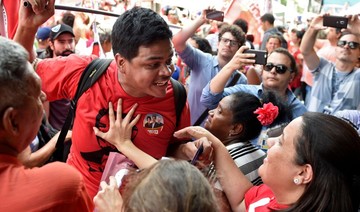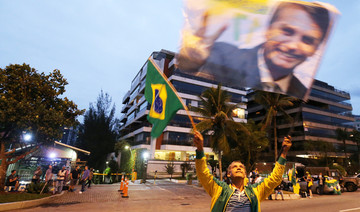SAO PAULO: A far-right former army captain who expresses nostalgia for Brazil’s military dictatorship won its presidential election by a surprisingly large margin Sunday but fell just short of getting enough votes to avoid a second-round runoff against a leftist rival.
Jair Bolsonaro, whose last-minute surge almost gave him an electoral stunner, had 46.7 percent compared to 28.5 percent for former Sao Paulo Mayor Fernando Haddad, Brazil’s Superior Electoral Tribunal said after all the votes were counted. He needed over 50 percent support to win outright.
Polls predicted Bolsonaro would come out in front on Sunday, but he far outperformed expectations, blazing past competitors with more financing, institutional backing of parties and free air time on television.
Ultimately, Bolsonaro’s strong showing reflects a yearning for the past as much as a sign of the future. The candidate from the tiny Social and Liberal Party made savvy use of Twitter and Facebook to spread his message that only he could end the corruption, crime and economic malaise that has seized Brazil in recent years — and bring back the good ol’ days and traditional values.
“I voted against thievery and corruption,” said Mariana Prado, a 54-year-old human resources expert. “I know that everyone promises to end these two things, but I feel Bolsonaro is the only one can help end my anxieties.”
The two candidates have painted starkly different visions of the country’s past and future.
Bolsonaro has portrayed a nation in collapse, where drug traffickers and politicians steal with equal impunity, and moral rot has set in. He has advocated loosening gun ownership laws so individuals can fight off criminals, giving police a freer hand to use force and restoring “traditional” Brazilian values — though some take issue with his definition of those values in light of his approving allusions to dictatorship era torturers and his derisive comments about women, blacks and gay people.
He capitalized on Brazilians’ deep anger with their traditional political class and “throw the bums out” rage after a massive corruption investigation revealed staggering levels of graft.
Beginning in 2014, prosecutors alleged that Brazil’s government was run like a cartel for years, with billions of dollars in public contracts handed out in exchange for kickbacks and bribes.
Revelations of suitcases of cash, leaked recordings of incriminating exchanges between powerbrokers and the jailing of some of the of the country’s most powerful people, including da Silva, unfolded like a Hollywood script — and then became one: Netflix released a (barely) fictionalized account of the probe this year.
The Workers’ Party was at the center of that investigation, and it has struggled to stage a comeback with Haddad, who has portrayed a country hijacked by an elite that will protect its privileges at all costs and can’t bear to see the lives of poor and working class Brazilians improve.
Haddad has promised to roll back President Michel Temer’s economic reforms that he says eroded workers’ rights, increase investment in social programs and bring back the boom years Brazil experienced under his mentor, da Silva.
Though they come from opposite sides of the political spectrum, both Bolsonaro and Haddad ran campaigns based on nostalgia for a better time. Bolsonaro frequently evoked the country’s 1964-1985 military dictatorship amid promises of a return to traditional values and safer, simpler times. In one of his last appeals to voters before Sunday’s voting, Bolsonaro tweeted that he would “defend the family and the innocence of children, treat criminals as such and not get involved in corruption schemes.”
The Workers’ Party, meanwhile, pushed the narrative that a vote for Haddad would be a vote to bring back the boom years that Brazil experienced under the leadership of da Silva, his mentor. On the eve of the election, da Silva tweeted: “Reach back into your memory, remember what my eight years of government were like.”
Bolsonaro’s poll numbers have increased by about 15 percent since he was stabbed Sept. 6. He was unable to campaign or participate in debates as he underwent surgeries during a three-week hospital stay, but instead brought messages directly to voters via Facebook and Twitter.
“For a front-runner, the best thing to do is commit as few errors as possible,” said Andre Portela from Getulio Vargas Foundation, a leading university and think tank. “Getting stabbed helped Bolsonaro in that. He wasn’t exposed to debate, to people questioning him.”
The campaign to run Latin America’s largest economy, which is a major trade partner for countries in the region and a diplomatic heavyweight, has been unpredictable and tense. Da Silva led initial polls by a wide margin, but was banned from running after a corruption conviction. Bolsonaro’s stabbing forced candidates, and Bolsonaro himself, to shift strategies and recalibrate.
All along, Brazilians have said their faith in leaders and their hopes for the future are waning.
This election was once seen as the great hope for ending a turbulent era in which many politicians and business executives were jailed on corruption charges, a president was impeached and removed from office in controversial proceedings, and the region’s largest economy suffered a protracted recession.
Instead, the two front-runners merely reflect the rabid divisions that have opened up in Brazilian politics following former President Dilma Rousseff’s impeachment and the revelations emerging from the “Car Wash” graft probe.
Caught in the middle are Brazilians who dislike both candidates and see them as symbols of a broken system.
“I think we’re going to continue with the same polarization,” if either Haddad or Bolsonaro wins, said Victor Aversa, a 27-year-old massage therapist who voted for center-left candidate Ciro Gomes, who had been polling third. “We’ve been on this path of crazy bipolarity. Haddad and Bolsonaro will both lead populist governments.”
Brazil’s far-right candidate falls short of election stunner
Brazil’s far-right candidate falls short of election stunner
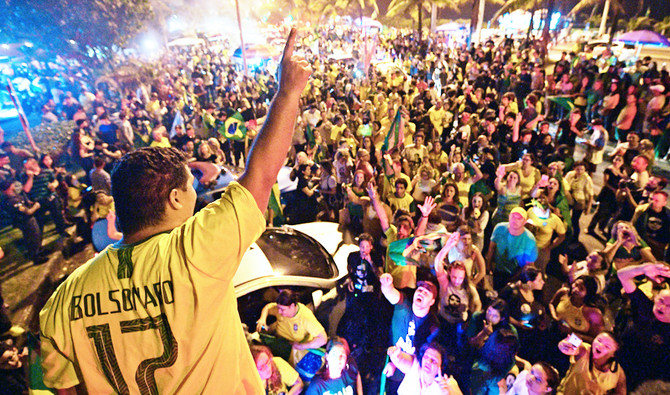
- With 92.5 percent of returns in, congressman Jair Bolsonaro was leading polls with 47 percent of the votes
- Bolsonaro has painted a nation in collapse, where drug traffickers and politicians steal with equal impunity, and moral rot has set in
Philippines seeks to position itself as top tourism destination at Arabian Travel Market
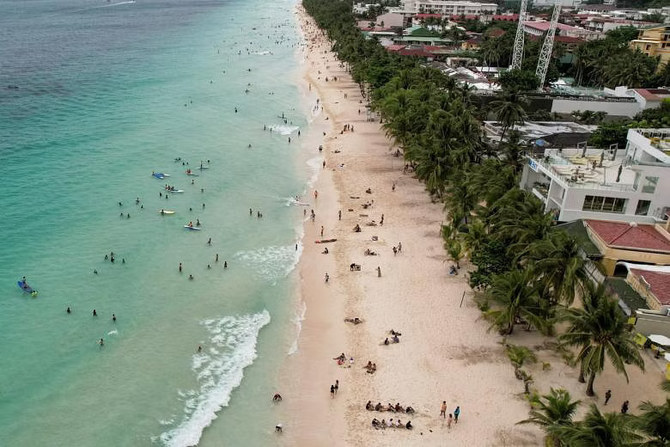
- Philippines has recorded 10 percent increase in visitors arriving from Gulf countries this year
- The country wants to become a preferred destination in Asia and the world
MANILA: The Philippines is working to attract more visitors from the Middle East and position itself as a preferred destination for international travelers, its tourism stakeholders said ahead of the Arabian Travel Market in Dubai.
More than 2,300 exhibitors and delegates from over 165 countries are joining the annual Arabian Travel Market, which this year will take place from May 6 to 9 at the Dubai World Trade Center.
In the Philippines, known for its white sandy beaches, diving spots and diverse culture, tourism is a key sector, contributing nearly 13 percent, or about $44 billion, to its gross domestic product in 2019.
The Department of Tourism will be leading the Philippine delegation in Dubai, as officials set their eyes on promoting the country’s best tourism to the international market.
“We look forward to these opportunities to share the Filipino story to the rest of the world … and to reinforce the Philippines’ position as a preferred destination and top-of-mind choice for travelers,” Secretary of Tourism Christina Garcia Frasco said in a statement.
With its participation at the Arabian Travel Market, the Philippines hopes to sustain the momentum from increased tourist arrivals from the Middle East, she added.
The Philippine tourism industry will not only promote their strengths, such as their tropical and natural attractions, but also diverse offerings in gastronomy and culture, as well as the Filipino tourism workers, “who serve as our best asset for their distinct hospitality and warmth,” Frasco said.
The Philippines has welcomed more 2 million international travelers since the beginning of the year, according to data from the tourism department. This includes a 10 percent increase in visitors arriving from Gulf countries, especially Saudi Arabia and the UAE, which has been among the Philippine government’s key emerging-market targets.
“There’s been a remarkable surge in outbound tourism from the Middle East, particularly from Gulf Cooperation Council countries … We see a growing appetite for international travel among GCC citizens and we see this trend continuing to rise in the coming years,” said Maria Margarita Montemayor Nograles, chief operating officer of the Tourism Promotions Board.
“This is one of the major reasons why we are doubling down on our efforts to maintain and enhance our presence in the Middle East. With our continued participation at the ATM, we aim to position the Philippines as a top-of-mind destination in Asia.”
Tourists from the Middle East are growing more important for some Filipino tourism operators, and represent a significant segment of their clientele, said Manih Karay, president of CTPH Tour.
“To appeal to tourists from Arab countries and promote the Philippines, we highlight the country’s natural beauty, rich cultural heritage, and warm hospitality … Their interest in exploring new destinations and cultural experiences aligns well with our commitment to providing inclusive and diverse travel services,” Karay told Arab News.
Arab tourists also contribute to the growth of the Philippines’ tourism industry, Karay said, adding that they foster cultural exchange and economic development.
“Their visits not only enrich our travel experiences but also promote mutual understanding and appreciation among different cultures,” she said.
Suspected Kashmir rebels kill Indian air force corporal
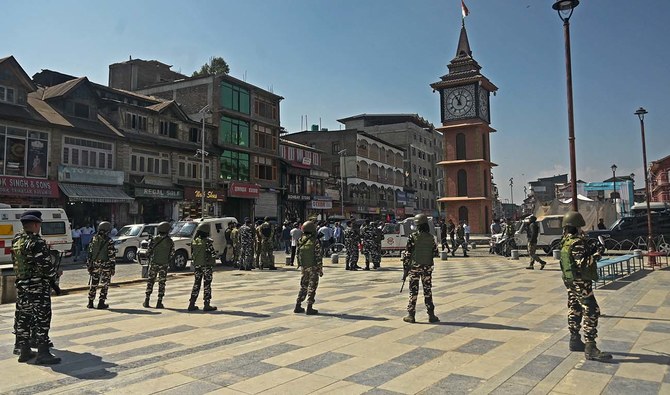
- Suspected rebels ambushed military convoy in Indian-administered Kashmir, Indian Air Force says
- Since 1989, rebel groups opposed to Indian rule have waged insurgency in disputed territory
SRINAGAR, India: An Indian air force member was killed and four more injured when suspected rebels ambushed a military convoy in Indian-administered Kashmir, an official statement said, as campaigning for national elections continues in the disputed territory.
The convoy was attacked by an unknown number of armed militants who sprayed automatic rifle fire toward at least one air force truck in the mountainous Poonch area, 200 kilometers (124 miles) south of the main city of Srinagar, the air force said in a statement.
Five air force personnel were hit in the firefight late Saturday and “one Air Warrior succumbed to his injuries later,” it said, identifying the dead man as a corporal.
A neighboring constituency took part in the first phase of India’s general election on April 19, and Poonch voters were originally scheduled to cast their ballots this week but the Election Commission of India has postponed the polling to May 25 because of inclement weather in recent days.
Kashmir has been divided between India and Pakistan since their independence in 1947, with both claiming the high-altitude territory in full but administering it in parts.
Since 1989, rebel groups opposed to Indian rule have waged an insurgency in Indian-controlled Kashmir, demanding either independence or a merger with Pakistan.
The conflict has left tens of thousands of civilians, soldiers and militants dead.
Rebel activity in the territory has registered an uptick since last month as campaigning for the elections picked up in the restive region.
In April, three suspected rebels were killed and a police officer and three soldiers wounded in three separate clashes across the territory.
Violence has drastically dropped since 2019, when Prime Minister Narendra Modi’s government revoked the region’s limited autonomy and stepped up a security chokehold.
Voting in India’s six-week-long national election, which started last month, will end on June 1.
Driver dies after crashing into White House perimeter gate, Secret Service says

- The driver was not immediately identified
WASHINGTON: A driver died after crashing a vehicle into a gate at the White House Saturday night, authorities said.
The driver was found dead in the vehicle following the crash shortly before 10:30 p.m. at an outer perimeter gate of the White House complex, the US Secret Service said in a statement.
Security protocols were implemented but there was no threat to the White House, the agency said.
The driver was not immediately identified.
The Secret Service will continue to investigate the matter, while turning over the fatal crash portion of the investigation to the Washington Metropolitan Police Department, the agency said.
Fake videos of Modi aides trigger political showdown in India election

- Indian police arrest nine people for circulating fake video of Indian Home Minister Amit Shah
- With more than 800 million Internet users, tackling misinformation in India is a huge challenge
BENGALURU/LUCKNOW: Manipulated videos are taking center stage as campaigning heats up in India’s election, with fake clips involving two top aides of Prime Minister Narendra Modi triggering police investigations and the arrest of some workers of his rival Congress party.
In what has been dubbed as India’s first AI election, Modi said last week fake voices were being used to purportedly show leaders making “statements that we have never even thought of,” calling it a conspiracy “to create tension in society.”
Indian police — already investigating the spread of fake videos showing Bollywood actors criticizing Modi — are now investigating a doctored online clip that showed federal home minister Amit Shah saying the ruling Bharatiya Janata Party will stop certain social guarantees for minorities, a subject sensitive for millions of voters.
Shah retorted on X, posting his “original” and the edited “fake” speech and alleging — without providing any evidence — that the main opposition Congress was behind the video it created to mislead the public. The minister said “directions have been issued to the police to address this issue.”
Indian police arrested at least nine people, including six members of Congress’ social media teams, in the states of Assam, Gujarat, Telangana and New Delhi last week for circulating the fake video, according to police statements.
Five of the Congress workers were released on bail, but the most high-profile arrest made by the cybercrime unit of New Delhi police came on Friday, when they detained a Congress national social media coordinator, Arun Reddy, for sharing the video. New Delhi is one region where Shah’s ministry directly controls police. Reddy has been sent into three-day custody.
The arrest has sparked protests from Congress workers with many posting on X using the #ReleaseArunReddy tag. Congress lawmaker Manickam Tagore said the arrest was an example of “authoritarian misuse of power by the regime.”
Congress’ head of social media, Supriya Shrinate, did not respond to messages and an email seeking comment.
MISINFORMATION
India’s election from April 19 to June 1 will be the world’s largest democratic event. With nearly a billion voters and more than 800 million Internet users, tackling the spread of misinformation is a high stakes job. It involves round-the-clock monitoring by police and election officials who often issue take down orders to Facebook and X as investigations start.
In India’s most populous state of Uttar Pradesh, more than 500 people keep tabs on online content, flagging controversial posts and coordinating with social media companies for their removal when needed, police chief Prashant Kumar told Reuters on Saturday.
Another fake video that sparked a storm last week showed Yogi Adityanath, the state’s chief minister, criticizing Modi for not doing enough for families of those who died in a 2019 militant attack. Though fact checkers said the video was created using different parts of an original clip, state police called it an “AI generated, deepfake.”
Using Internet address tracking, state police arrested a man named Shyam Gupta on May 2 who had shared the fake video post on X a day earlier, receiving over 3,000 views and 11 likes.
The police have accused Gupta of forgery and promoting enmity under Indian law provisions that can carry a jail term of up to seven years if convicted. Reuters could not reach him as he is currently serving a 14-day custody period.
“This person is not a tech guy. Had he been tech savvy, arresting him quickly would not have been possible,” said police officer Kumar.
Australian police shoot boy dead after stabbing with ‘hallmarks’ of terrorism

SYDNEY,: Australian police said on Sunday they had shot dead a boy after he stabbed a man in Western Australia’s capital Perth, in an attack authorities said indicated terrorism.
There were signs the 16-year-old, armed with a kitchen knife, had been radicalized online, state authorities said, adding they received calls from concerned members of the local Muslim community before the attack, which occurred late on Saturday night.
The attack, in the suburb of Willetton, had “hallmarks” of terrorism but was yet to be declared a terrorist act, police said.
“At this stage it appears that he acted solely and alone,” Western Australia Premier Roger Cook told a televised press conference in the state capital Perth, regarding the attacker.
The victim, stabbed in the back, was stable in hospital, authorities said.
Prime Minister Anthony Albanese said he had been briefed on the incident by police and intelligence agencies, which advised there was no ongoing threat.
“We are a peace-loving nation and there is no place for violent extremism in Australia,” Albanese said on social media platform X.
The incident comes after New South Wales police last month charged several boys with terrorism-related offenses in investigations following the stabbing of an Assyrian Christian bishop while he was giving a live-streamed sermon in Sydney, on April 15.
The attack on the bishop came only days after a stabbing spree killed six in the Sydney beachside suburb of Bondi.
Gun and knife crime is rare in Australia, which consistently ranks among the safest countries in the world, according to the federal government. (Reporting by Sam McKeith in Sydney; Editing by Christian Schmollinger and William Mallard)



